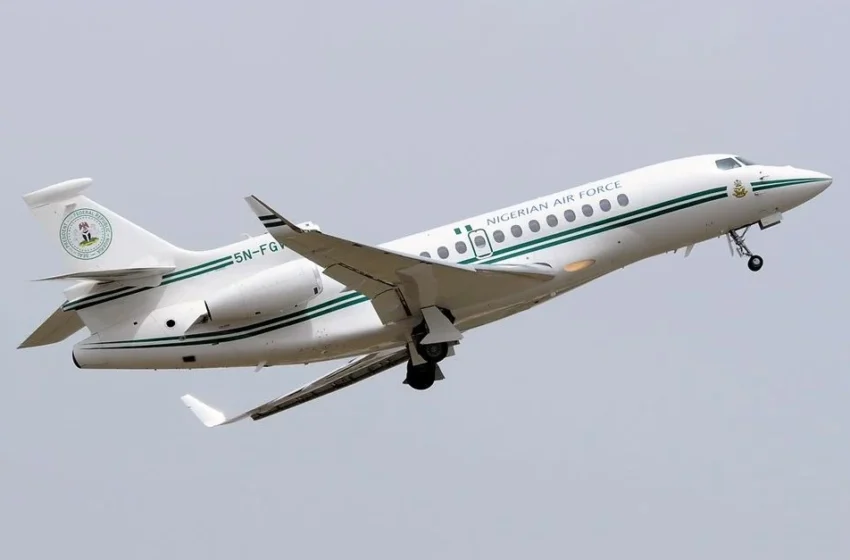Nigerian Presidential Jet sale: Who might buy it?

Nigerian Presidential Jet on sale
The Nigerian government has officially listed one of its oldest presidential aircraft, a Boeing Business Jet (BBJ) 737‑700 acquired during the Obasanjo administration, for sale. The aircraft, grounded in Switzerland and maintained by AMAC Aerospace, is being offered to international buyers following the recent acquisition of a new presidential jet by President Bola Tinubu’s administration. This move aligns with the federal government’s strategy to cut down on excessive expenditure associated with maintaining an aging fleet.
Why Nigeria Is Selling Presidential Jet
The decision to sell the jet was prompted by rising maintenance costs and safety concerns. The aircraft experienced a mid-flight fault en route to Saudi Arabia in 2024 and was grounded shortly after. Although the interior was refurbished last year, its two engines are no longer covered by maintenance contracts, posing significant risks and financial burdens. The government has since deemed the BBJ unsuitable for continued use, especially after investing over ₦150 billion in a new presidential aircraft.
Officials within the Presidential Air Fleet (PAF) noted that routine engine overhauls on the BBJ could cost millions of dollars, not including the expense of storage and compliance with international aviation regulations. By offloading the plane, the government hopes to reduce liability while recouping some of its sunk costs through resale.
Presidential Jet Features That Attract Buyers
The Obasanjo-era BBJ boasts a fully customized VIP interior with space for 33 passengers and eight crew members. Its five-cabin layout includes a master stateroom with ensuite bathroom, a private conference area, business-class seating, and advanced avionics including Ka-Band Wi-Fi and ADS-B Out capability. It also features auxiliary fuel tanks, extending its range and making it suitable for transcontinental travel.
This configuration makes it ideal for VIP charters, executive use, or head-of-state transportation. Despite its age, the aircraft was recently updated with C1-C2 checks and remains airworthy, according to AMAC Aerospace. The listing on Controller.com suggests the government is marketing it as a high-end aircraft for the right buyer at a significant discount compared to newer BBJs.
Who the Potential Buyers Might Be
1. Charter Aviation Firms
Companies specializing in luxury private charters could be top contenders. The BBJ’s full VIP fit-out, long-range capability (with extra fuel tanks), and full suite of onboard amenities makes it ideal for wealthy clientele or corporate use. The aircraft’s capacity and onboard luxuries provide a strong value proposition in the secondary aircraft market.
2. Emerging Governments and Heads of State
Nations or heads of state currently without a luxury state aircraft may see this jet as affordable long-range transport, especially if refurbished further. Its presidential pedigree may also appeal to governments building diplomatic capacity. Government buyers from Africa, Southeast Asia, or Latin America are being closely watched as the most strategic suitors.
3. Middle Eastern VIP Operators
Given the region’s appetite for opulent VIP jets, Middle Eastern private operators or freestanding charter companies may be eyeing the aircraft as a prestige purchase at a discount compared to brand-new models.
Sale Process & Listing Details
The sale is being handled by AMAC Aerospace in Basel, Switzerland, where the aircraft is currently stored. Although the government has not disclosed a public asking price, industry experts estimate that it could fetch between $20 million and $25 million based on age, equipment, and usage. Interested parties are expected to submit bids directly through the listing broker.
The federal government confirmed that the aircraft remains under the supervision of the Presidential Air Fleet and Nigeria Air Force, pending transfer to a new owner. All inspections and airworthiness checks have been carried out by AMAC, making the jet ready for immediate sale and delivery.
Fleet Modernization Under Tinubu
President Tinubu’s recent approval of a ₦150 billion Airbus A330-200 to replace the older BBJ marked a turning point in Nigeria’s aviation policy. The administration has faced pressure to streamline the bloated presidential fleet, which includes 10 aircraft ranging from helicopters to Gulfstream jets. The BBJ sale is the first public step toward that goal.
By reducing redundant assets and selling aging jets, the government aims to reinforce its message of fiscal discipline and responsible governance. The savings from jet maintenance could be redirected toward key national infrastructure or healthcare priorities, according to budget analysts.
What Happens Next?
The BBJ remains in Swiss storage awaiting a buyer. Once the transaction is completed, the government is expected to decommission more aircraft, particularly those with high maintenance costs and limited use. This could lead to more listings in the near future as Nigeria continues to rationalize its VIP transport options.
Observers suggest that a successful sale could also prompt other African nations with oversized fleets to consider similar downsizing efforts. With Nigeria taking the lead, the resale of presidential aircraft could become a trend in regional asset management.
READ MORE
Enugu Air begins operations: What you should know
Final Analysis: A Win-Win or Political Gamble?
While the sale offers potential financial and symbolic benefits, it may also attract scrutiny over transparency and the final sale amount. If Nigeria successfully sells the BBJ at market value, it would set a precedent for better management of national assets. However, if the aircraft goes for far less due to age or engine costs, critics may question the timing and planning behind the deal.
Ultimately, the move reflects a shift toward pragmatism in Nigeria’s aviation strategy, swapping legacy prestige for cost-efficiency. Whether this approach pays off will depend on the eventual buyer, the deal structure, and how the government utilizes the recovered funds.

